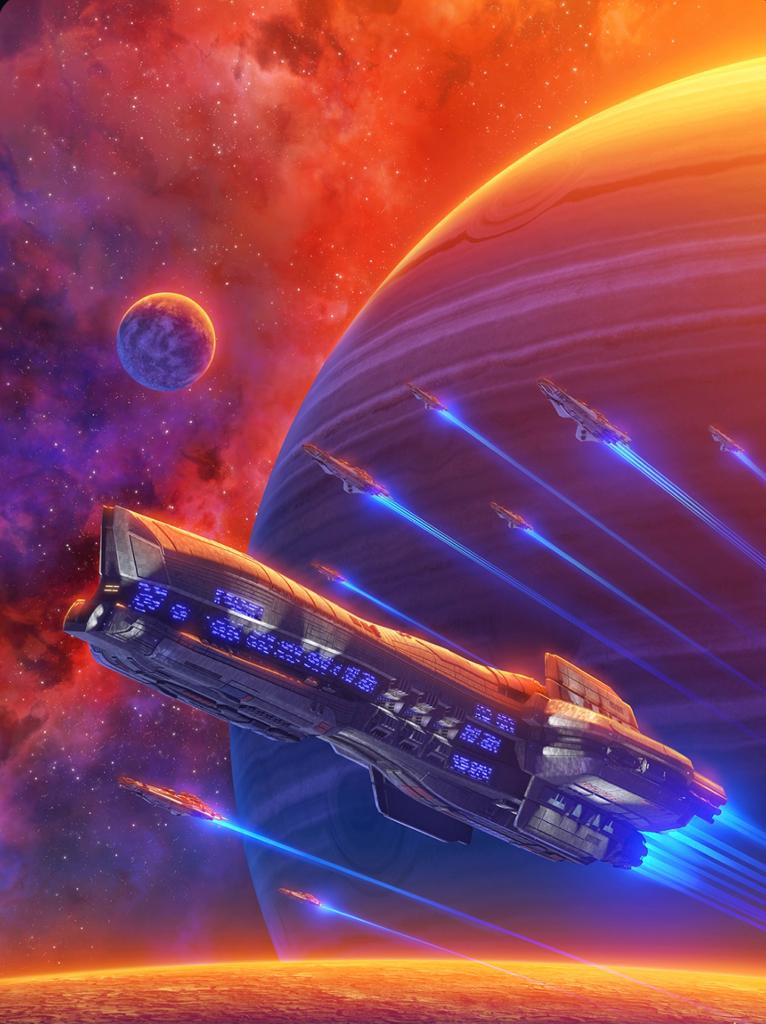By Owen Button, Y11
The three-month journey had been a silent one, interrupted only by the rhythmic pulsing of the Columbia’s reactor and the quiet chatter of those who had elected to remain awake for the trip. Sergeant Jack Unger liked the quiet; he’d taken the time to read at least fifteen books, some more than once, and had systematically beaten every video game in the ship’s small collection in peace before finally resigning himself to grumbling about his decision to stay conscious. Nevertheless, he was still slightly mournful when the steadfast silence was cut short by the screech of Columbia’s hull as the cruiser made contact with the edge of Earth’s gravitational field, a solemn announcement to the end of the journey. Less than twenty minutes later the ship was a hive of activity.
Men and women who had spent the trip in cryosleep awoke from their slumbers and began to stretch their frozen muscles, restarting conversation exactly where they had left off three months earlier as they began to bring the cruiser back to life. The sudden explosion of noise was deafening to Jack’s sensitive ears; 90 days of silence had deprived his senses of acoustical sustenance, and the rapid change quickly overwhelmed them. There was no cure to this, and the ship would only get louder as the day went on, leaving him no choice but to wait for his ears to adjust.
Ignoring a splitting headache, he proceeded down the Columbia’s corridors to the command room, a cramped compartment of the ship dimly lit by a collection of glowing monitors and displays. Only half of the staff was present when Jack entered the room; he took the time to find a quiet corner and review the mission details.
The Columbia was an advanced expeditionary cruiser, designed with the durable hull and high-endurance engines needed for interstellar scouting and salvage missions. For this mission, she carried the heavy machinery necessary for the latter. Her target was the planet below.
Fifty years prior, a border dispute between India and Pakistan had rapidly escalated into a strategic nuclear exchange, a conflict that resulted in over four million deaths and billions of dollars worth of infrastructure destroyed on both sides. The most devastating effect, however, was located dozens of kilometers above the surface. A trio of high-flying ballistic missiles had detonated over Islamabad, creating an EMP strong enough to short-circuit any Pakistini equipment in the surrounding region and cripple the army stationed in the city. The pulse was also strong enough to severely disrupt Earth’s magnetic field, effectively tearing a massive gash in the upper atmosphere. Exposed to the sun’s lethal radiation, the subtropical regions were instantly ravaged by solar rays, scorching a massive belt around the planet as more of its protective magnetic shield was steadily burnt away. Global temperatures skyrocketed, and massive solar storms swept mercilessly across the remaining countries. A frantic United Nations task force, threatened with the extinction of the human race, combined nearly all of their surviving resources into a desperate attempt to evacuate the global civilizations to Mars. What resulted was the largest, most chaotic exodus in human history, one that managed to allow three billion people to escape to the red planet. The migration was widely considered a miracle, but the new nations needed infrastructure to survive, and much of it was located back on Earth. Thus, the salvage operations had begun.
Columbia’s mission was simple enough; the ship’s teams would recover as much machinery as possible from a major factory complex located in West Virginia and a pair of preserved nuclear reactors from a shipyard in Norfolk. The ship’s escort, the Japanese frigate Mikuma, would be recovering data from a manned installation on Earth’s moon.
Jack would be leading the group at Norfolk. It suited him just fine. He had never been in favor of the lunar missions; as much as he enjoyed the quiet, something about the silence of space had unnerved him for reasons he couldn’t explain. One mission to the moon had been enough for him. After quickly reviewing the rest of the operation’s details, joined the rest of the command staff in the center of the room for the briefing from the force commander, an aging man who had commanded over thirty missions in his life. The lecture was kept short; much of the staff, like Jack, had gone over the details for their own mission beforehand, and questions were few. Not more than an hour later, the massive landers were breaking away from the Columbia’s hull and beginning their descent towards the North American continent.
Jack despised this part of the journey. The ‘descent’ was nothing more than a controlled freefall, and the lander had no windows. Strapped to his seat with crash webbing and a growing sense of claustrophobia, he let himself black out the moment the ship entered the stratosphere. When he awoke, the lander was slowing, a relieving signal of the trip’s end. Ten minutes later, the ship groaned as it landed in the water above what used to be Norfolk International Airport. Fifteen minutes after that, the bay doors opened, revealing what used to be a thriving city.
As a result of Earth’s rapid change in temperature, all of the planet’s ice caps had melted, raising global seal level by nearly a hundred meters and drowning dozens of coastal cities in the process. Primarily built around its naval base and shipyard, Norfolk was one of these flooded metropolises, thousands of buildings and homes buried beneath a ghostly layer of water. Jack hadn’t been there before the disaster, but the sight was eerie nonetheless. After a few moments, he shook off the trance and began to focus on the mission. Just over twelve kilometers away, he could see the distant, massive shapes of the American aircraft carriers, still anchored at their flooded piers. Each one held a nuclear reactor. Formulating a plan in his head, he turned back to the two hundred men still struggling out of their webbing. “Alright gentlemen,” he began, cracking a smile, “Let’s get to work.”
Four hundred thousand kilometers away, the Japanese team was exiting their lander onto the lunar surface. Their own descent, much smoother than the Americans’, had landed them less than a kilometer from their lab, and they proceeded towards it at an unhurried pace. To the West, the sun was slowly settling beneath the horizon. Given the moon’s lack of atmosphere, it was a relatively unimpressive sight; only the length of the shadows changed. They were near the entrance to the lab, a linked collection of glass domes and solar panels, when a glimmer of light caught Kodai’s eye. Slipping out of the back of the procession, no one saw him leave. He reached the spot in only ten bounds, almost falling over as he stumbled to a halt. The sight raised the hair on the back of his neck.
There were five bodies, all arranged neatly in a line. Their spacesuits were torn open; inside each there was nothing left to identify the bodies as human. Gagging inside his helmet, Kodai turned away and let his breathing slow. Despite his panic, he still faintly remembered that he only had a limited supply of oxygen. After steadying himself, he began to leap back towards the lab, each bound feeling like an eternity. Halfway there, he lost his balance and fell hard on the rocky surface. He was getting back to his feet when an impact knocked him back onto his stomach. He’d forgotten to turn on his radio. He let out a scream that never reached beyond his helmet.
Ten kilometers above the moon’s surface, an ensign on the Mikuma stared at his display in mild annoyance. The six signals denoting astronauts on his lifeform scanner had suddenly become seven, an issue he quickly attributed to a malfunction in the frigate’s aging equipment. Sighing, he refreshed the display and waited for the system to reboot. When the visual reappeared, there were only six.



